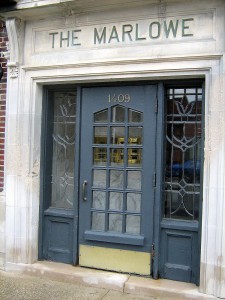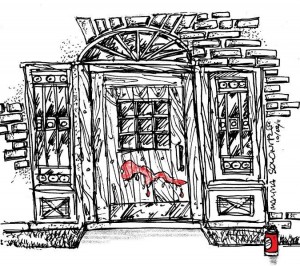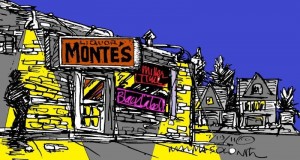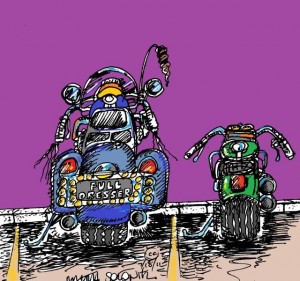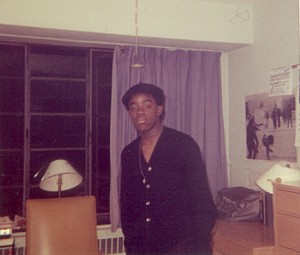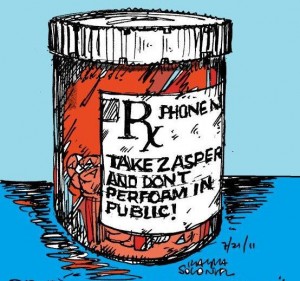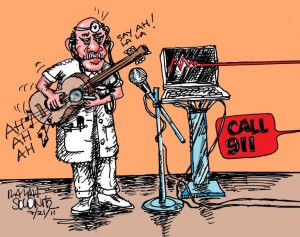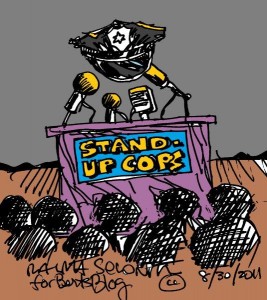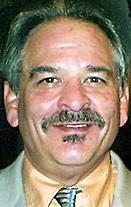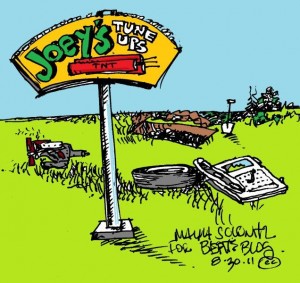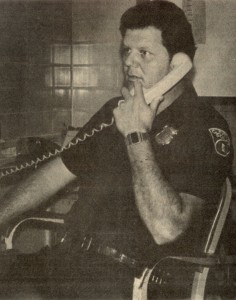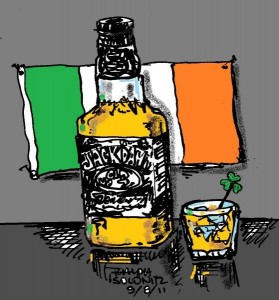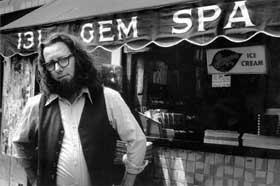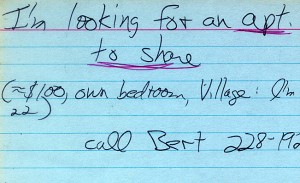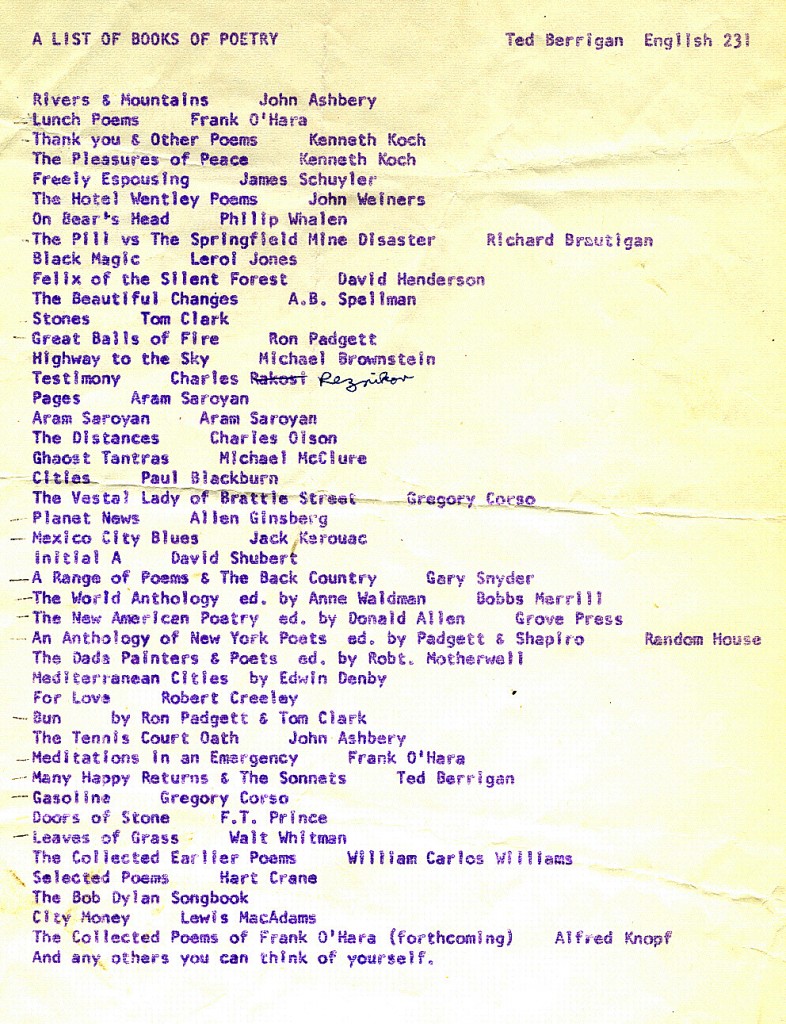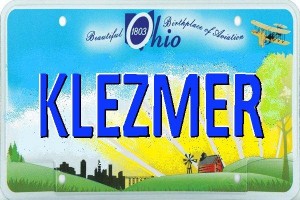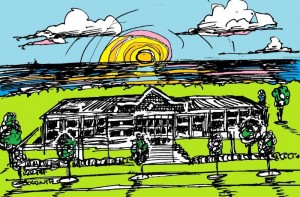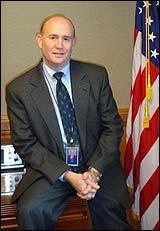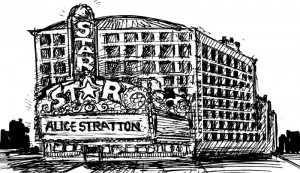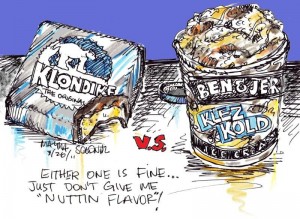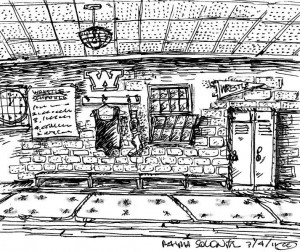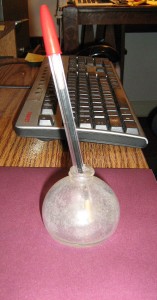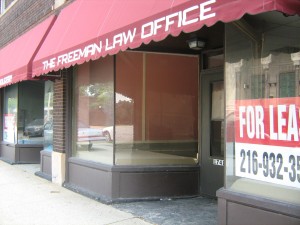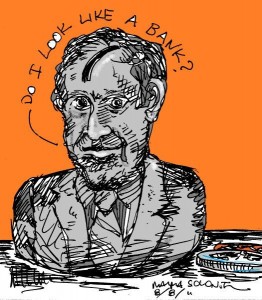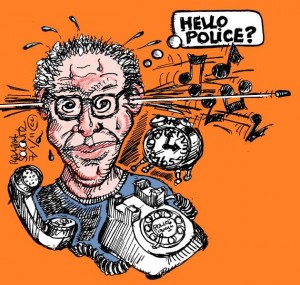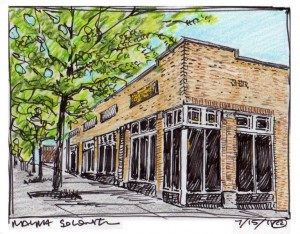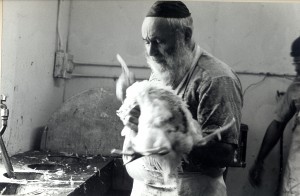TWO CREEPS BUSTED
I went easy on a tenant, rent-wise, because he called the police on a leaded-glass thief, who had stolen windows from the apartment building’s entrance. (The windows were sidelights.)
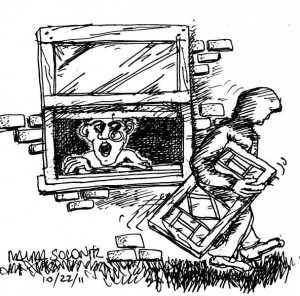
The cops asked my tenant, “Would you be a witness?” My guy — Bill Livingstone — said yes. I appreciated his civic involvement.
Livingstone was nosy. That was a good thing. Livingstone, a poodle groomer, stayed at the building 23 years.
***
A vandal scrawled graffiti on a front door. Livingstone wasn’t around. (Different building.)
The building manager knew the graffiti “artist.” She even knew his phone number. My custodian personally knows this derelict? The graffiti “artist” was a friend of a friend of the custodian. The “artist” hung out at a skaters coffeehouse and had a recognizable tag. My custodian, a lesbian brakeman with multiple piercings, knew the scene.
I phoned the graffiti kid. What if he was nuts? I hung up. Let the cops handle it.
The kid called me. “You just called my cell.”
I hate that.
The cops found him and made him clean up the doors. His mom even helped. The kid was in high school. I didn’t press charges because he cleaned the door.
***
Re: the leaded-glass sidelights thief. That guy was caught due to Bill Livingstone’s accurate ID of the man. (The thief sold the windows to an antiques store.) The man was charged with aggravated burglary and grand theft.
He didn’t do any jail time. He made restitution to me over a couple years.
I’ve been fortunate. Thanks to Bill Livingstone, tuned-in building managers and persistent police detectives.
October 26, 2011 3 Comments
THE BILLYS
My parents often name-dropped Billys, who I usually didn’t recognize.
The Billys were:
1.) Billy Rose. He put together the Aquacade show at the Great Lakes Exposition in 1936-7. The Aquacade was a theater-like pool. There was an orchestra and synchronized swimming. Johnny Weissmuller starred in it. Billy Rose took the show to the New York World’s Fair in 1939.
2.) Billy DeWolfe. A character actor. Billy De Wolfe occasionally ate at my Great Uncle Itchy’s restaurant, Seiger’s, on Kinsman Road. Was Billy De Wolfe really Billy D. Wolf, Billy The Wolf, or what?
3.) Billy Weinberger, a Short Vincent Street restaurateur (Kornman’s) who moved to Las Vegas in 1966 and took over Caesar’s Palace. My Uncle Al got discount hotel rates “from Billy” in Vegas. Billy was close with the Cleveland mobsters who started Vegas.
***
Did I ever name-drop Billys to my kids? I don’t think so. I can’t think of any Billys. My parents took all the Billys.
I did Garys: Gary Moore, Gary Powers and Gary Lewis.
—
Bonus: Whatever Happened to Putt Putt?, an original video:
October 19, 2011 5 Comments
ALMOST BLACK LIKE ME
At Monte’s bar in South Euclid, there was a lot of talk about blacks, but no blacks.
For instance, a Harley Electra Glide was a “nigger-lighted” Harley. The Harley Electra Glide was the black man’s bike because it had after-market trim lights. The white man’s bike was the Harley Sportster, the chopper.
“Nigger fishing” meant casting from the power-plant pier instead of from a boat. Sheepshead was a “nigger fish,” usually caught from the pier. Lake Erie perch was a high-end fish, often requiring a boat to catch.
Monte’s bar also featured Italian specials like tizzone (“coal”) and mulunyan (“eggplant”).
I went to Monte’s to see my neighborhood friend Frank, a mutuel clerk at the racetrack. He wore a snub-nosed .38 in a shoulder harness and always had a wad of cash. Frankie didn’t like dirty money. “I can’t stand it when people give me dirty bills,” he said.
Frank’s mother had played banjo in an all-women’s band, and his father had idolized trumpeter Harry James.
Frank played trumpet in a white soul band. He kidded me because I dabbled in a “nigger band” — a band with blacks.
I was interested in soul jazz (Hank Crawford, Wes Montgomery), which I had heard at my college dorm. I had lived across the hall from three Detroit black kids who were from inside 8 Mile — way inside. Two were dopers into scag (heroin), grass and cocaine. They railed at me for being so straight and suburban. I bothered them. They would say: “Bert, you be a trippin’ motherfucker . . . You’re a bitch with your shit . . . That motherfucker be trippin’ . . . ”
They kidded me because they loved me . . . “Stop playing that country shit!” (I played blues harmonica along to Brownie McGhee and Sonny Terry tapes.)
When money was low, the dopers would go to the parking garage across from the dorm and sniff gas from cars for a high. That was called “hitting the tank.”
The third black kid was a non-doper. He was middle-class, an “elite.” He moved to another floor and became a doctor.
At Monte’s bar, patrons liked the idea of blacks and black slang. I was the maven on the subject. Frankie suggested I go to the ghetto and talk shit.
Great idea. I went to Hough and walked past an angry black man (not too hard to find in the early 1970s) and said, “What’s happnin’, man?”
“Nothin’ to it,” the man said, not breaking stride.
I was hip. He was hip.
I stayed hip for another two years, until I took an ulpan (Hebrew course) at Case Western Reserve Hillel.
—-
“Monte’s bar” is a made-up name. “Frank” is also a pseudonym.
—
More on Frankie at today’s CoolCleveland.com. See “Mom’s Dating Service.”
—
World-class shofar playing from Cleveland . . .
More on this guy — and his Kickstarter project — here.
October 12, 2011 8 Comments
NO EVIDENCE OF DISEASE
Doctors like to complain how their pay isn’t what it used to be. Another gripe of docs is the increased paperwork.
But doctors do all right. They are one of the few professions that still hire bands.
A side benefit for Yiddishe Cup is we sometimes get free medical advice at gigs. At a Pittsburgh wedding, a doctor checked one of our guys for a hernia in the men’s room stall.
In Cleveland, a doctor asked me for an appointment. He was a Washington heart specialist, considering a job at the Cleveland Clinic. He played mandolin. He wanted to know if Cleveland had a good quality of life.
I said yes.
He spent several years at the Cleveland Clinic giving me –- and others — the lowdown on HDL. (The lowdown is there is no sure-fire way to raise your HDL.)
Yiddishe Cup occasionally gets gigs from immigrant doctors from South Africa. One doc had a diploma on his office wall from the University of Witwatersrand (South Africa). I thought “witch doctor” — like the doctor in the Mickey Katz parody “My Son the Knish Doctor.” The Katz doc had studied at the Bwana Wana Yeshiva.
South African doctors are often Litvaks (Lithuanian Jews) and plugged into Yiddish culture — what’s left of it.
***
I met a doc at Klezkamp who was atrocious on soprano sax and would repeat, “I’m a doctor! I’m a doctor!” That worked. It made him feel better.
He had a point. He saved lives. So what if he couldn’t play “Khasidim Tantz”?
Yiddishe Cup had a medical student in the band. Dave Jaffe, guitarist/singer and Case medical student. He lasted a year. Med school and the band were too much.
Doctors often form their own bands because of their busy schedules. These bands play a couple benefits a year and often have names like No Evidence of Disease.
I wish I had studied harder in Inorganic and Organic Chemistry. I wouldn’t mind being a brain surgeon with a side interest in klezmer.
Turns out I’m a klezmer musician with a side interest in brain surgery. This scares people.
I accept most insurance plans.
October 5, 2011 3 Comments
COPS ARE FUNNY
Cleveland cop Tommy Alusheff moonlighted as a comedian, using the stage name Morey Cohen — a conflation of Morey Amsterdam and Myron Cohen (two of Alusheff’s favorite comedians). Morey Cohen worked at Hilarities and other regional comedy clubs, plus he did some out-of-town gigs, like in Los Angeles.
Morey Cohen’s father, Chris Alusheff, owned the Baker Candy factory in Collinwood. Chris Alusheff once told me Jews like dark chocolate more than gentiles like it. Why? Kashrut? (Kosher dietary laws?) Probably. The Alusheffs were Macedonians. Their best-selling product was chocolate-covered whipped candy eggs, sold at Easter time.
Morey Cohen died last year. I didn’t go to the funeral; I only knew him by reputation. Morey wasn’t in the Sixth District, which had been my police beat. (I was a reporter in the 1980s.)
The top comedy cop at the Sixth District had been Paul Falzone, a stand-up guy, but not a stand-up comedian. Falzone was almost ready for prime time. I hung out with Falzone in the burglary unit at the East 152nd Street station, aka The District, the cop shop. The building had few windows. It was a fortress, built after the 1967 Hough riots. When the A/C went out in the building, it was a real sweat shop. Falzone said, “I have eight minutes of material to Morey’s twelve.”
Falzone asked me, “How are the Jewish holidays treating you?” It was September.
“Fine.”
“You’ve got to watch for neo-Nazis,” he said.
“Why?”
“Everyone has to watch for somebody. Italians, they got to watch out for other Italians; you start your car and it goes ba-boom instead of vroom. The Irish, they got to watch for Jack Daniels. Hey, how can you tell Ronald McDonald at a nudist colony?”
“How?”
“He’s the one with sesame seed buns.”
Falzone ran for county sheriff, and president of the patrolmen’s union. He didn’t win either. He eventually became police chief of Bratenahl, a suburb. Now he’s running for mayor of Bratenahl.
Two years ago Cuyahoga County tried to put Falzone in jail for theft. Something about drugs and guns missing from the Bratenahl property room.
Falzone was acquitted. Now he’s suing Bratenahl for “humiliation.” Doesn’t sound funny, but Falzone can probably get some jokes out of it. Bad jokes. He needs only four more minutes to match Morey Cohen . . .
“So I’m on patrol, and I walk into the Viking bar. I see a 16-year-old punk with a Miller’s. I say, “When’s your birthday, kid?”
He says, “October 10.”
“What year?”
“Every year.”
—
Footnote: The Sixth District became the Fifth District in 2008, when the Cleveland Police Department reapportioned the districts.
—
From illustrator Ralph Solonitz’s Parade of Nations collection:
September 28, 2011 5 Comments
EAST VILLAGE OTHER
In Patti Smith’s memoir, Just Kids, she hangs around with famous people on almost every page, even when she isn’t famous yet.
Patti needed 10 more cents for a sandwich at an automat. Allen Ginsberg appeared in back of her with a dime. Ginsberg mistook her for a “pretty boy.” Ginsberg bought her a coffee too.
Smith dated drummer Slim Shadow. After a few meetings, Slim told Patti he was really Sam Shepard, the playwright.
Patti ran into Janis Joplin a lot.
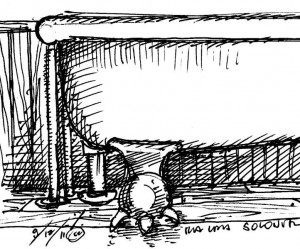 Ted Berrigan, the poet, lived on St. Mark’s Place. Berrigan’s tenement had a clawfoot bathtub in the kitchen. That was how tenements were built. Berrigan was in bed. It was the middle of the day. His wife, poet Alice Notley, said, “When Ted gets dressed, you two should go to Allen’s to get the mail.”
Ted Berrigan, the poet, lived on St. Mark’s Place. Berrigan’s tenement had a clawfoot bathtub in the kitchen. That was how tenements were built. Berrigan was in bed. It was the middle of the day. His wife, poet Alice Notley, said, “When Ted gets dressed, you two should go to Allen’s to get the mail.”
Alice Notley was addressing Berrigan and me. (I was in Berrigan’s apartment, not Just Kids.) Berrigan collected Allen Ginsberg’s mail when Ginsberg was out of town. Ginsberg’s place — on East 13th Street — was neat. It wasn’t messy like I had expected.
***
I played harmonica at Grand Central Station to assure myself I wasn’t just another commuter. I checked my bags in a Grand Central locker, then talked to a staffer at the outdoor convention-bureau kiosk. She directed me to the 34th Street YMCA.
French tourists at the Y asked me why the street was smoking. Smoke was wafting out of sidewalk vents. I figured it had something to do with the subway. (Am I right?)
A roommate service — Two for the Money — charged $40 to match you with a roommate in New York in 1972. I met Nathan outside the agency, so we didn’t pay the finder’s fee. We wound up on Waverly Place in Greenwich Village.
There were a lot of old people in Greenwich Village. Not the best of scenes — old people.
So I called Webfoot — his phone number was W-E-B-F-O-O-T — in the East Village. Webfoot said come over. He lived on Second Avenue and was asking only $100/month. ($539 in today’s dollars.) I spent a night there. He spit blood into the toilet and didn’t flush.
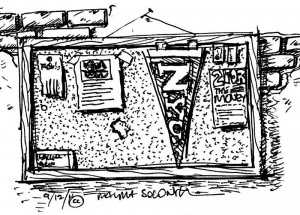 I checked out the NYU bulletin board and found an apartment in SoHo, across from where Ornette Coleman had played a loft concert. $100 for my share. A mature woman (30-something) answered the door and said, “Let me make this perfectly clear, you aren’t going to score with me if you move in here.”
I checked out the NYU bulletin board and found an apartment in SoHo, across from where Ornette Coleman had played a loft concert. $100 for my share. A mature woman (30-something) answered the door and said, “Let me make this perfectly clear, you aren’t going to score with me if you move in here.”
Score? Only swingers said score. Was this woman getting her news from Playboy? Had she missed the whole hippie thing?
I wound up in a studio apartment sublet on East 13th Street in the East Village for $150/month. The tenant upstairs was lifting weights, it seemed. I knocked on his door and said, “Can you tell me if you stay home all day and lift weights? I’m laying down $450 for a deposit and rent, and I don’t want to make a mistake.”
“I don’t lift weights.” He had a weightlifter’s build. “And you don’t knock on your neighbor’s door in New York. Where are you from?”
“Ohio.”
“That’s in Chicago, isn’t it?”
He also said his apartment had been broken into twice, and he had been mugged outside the apartment.
Maybe the wiser choice was the apartment on Waverly Place in the West Village. I called Nathan.
Too late. Nathan had rented the extra room to a law student.
I saw Patti Smith.
I saw her in Cleveland. It was her first show in Cleveland.
Is that worth anything?
—
Footnote: Ted Berrigan was a visiting professor at Michigan in the fall of 1969. Here’s the syllabus from a class I took:
September 21, 2011 6 Comments
THE VANITY OF KLEZMER
I could get the Ohio klezmer vanity plate.
In Chicago, a musician from the Maxwell Street Klezmer Band has the Illinois klezmer. I saw the Illinois plate on the cover of a Maxwell Street CD.
klezmer is taken in New York. I saw New York klezmer in the KlezKamp parking lot.
Ohio klezmer is available, according to the Ohio Bureau of Motor Vehicles.
Do I want klezmer? What if I cut somebody off; they’ll know it’s me. (I remember getting cut off by ezras.)
What if I’m checking out a potential tenant, and I’m parked by the guy’s sleazy mini-market on West 25th Street, and he comes out and has an anti-klezmer ’tude.
I remember mazel on Fairmount Boulevard.
I’ve seen yenta.
I’ve seen gevalt.
On Ohio’s newest license plate, you practically need a microscope to find the OHIO. Why does the state devalue Ohio so much? Ohio is pretty catchy compared to other states. How would you like to live in Maryland?
oHIo.
That’s my gift to the BMV.
Ohio first cluttered its plates in 1973 with Seat Belts Fastened? That innocent public service opened the doors to Birthplace of Aviation, Bicentennial 2003 and Beautiful Ohio.
OHIO in big block letters would work. If the BMV ever goes retro, back to block OHIO, 1950s-style, I would seriously consider klezmer.
I want a plate I can nail to the side of the barn and be proud of.
—
Footnote: Jewish license plates in California are well-documented, per this video:
September 14, 2011 8 Comments
MY PERSONAL G-MAN
The FBI building in Cleveland on Lakeside Avenue is on a bluff overlooking Lake Erie. The building is outside the downtown district by a few blocks and somewhat secluded.
I went there to see the head man.
To get to him, I went through two minutes of various security checks in the lobby. Then I was in the boss’ office, overlooking the lake. Nice. If the sun had been out, it would have been Santa Monica.
The boss, Gary Klein, and I were old friends from high school. Gary had been a fearless JCC-league basketball player. After high school, Gary went off to Annapolis, where he got his nose broken by a Southerner in a boxing match. Gary told me some of the students had razzed him because he was Jewish. It didn’t faze him.
Gary was tough, but not greaser tough. He was smart and bowlegged like a cowboy.
Gary showed me the FBI’s war room and the bug-proof room. He said FBI life looked glamorous but wasn’t. In 19 years he had lived in Boston, New York (Cosa Nostra and Russian mob work), Phoenix, Houston, Washington and Cleveland.
His new job was snooping on potential terrorists in northern Ohio, from Cleveland to Toledo. He said, “Ninety-nine percent of it is B.S. leads, like somebody dumping burial ashes over Parma Heights.”
Fighting terror was job one, forget about The Mob, he said.
Gary, how can we forget The Mob? They’re a lot more fun than Islamic terrorists! We grew up on The Mob. Hollywood wouldn’t exist without Mob movies. I had been inside the Little Italy house of James Licavoli (aka Jack White), the last head of the Cleveland Mob. Licavoli made wine in his cellar. Drinks all around.
Gary asked me to keep my eyes open.
I said I would. (This was 2003.)
So far nothing but B.S. leads, thank God.
September 7, 2011 3 Comments
HOLLYWOOD BOWLS US
My wife, Alice, was one of the many star-struck fans who drove to Rockside Road and I-77 in Cleveland to audition for The Avengers movie.
I asked Alice, “Did you get the part? Did you read anything?”
Not only did she not read, she did not even audition. The traffic was so horrendous at Rockside Road, she turned around. Thousands of people had shown up for the audition. The line of wannabes snaked at least a mile from the building, according to the Cleveland Plain Dealer.
There was another Hollywood movie, Fun Size, filmed a few weeks earlier, several blocks from our house in Cleveland Heights. That’s when Alice got star struck. Catering and make-up trucks were around our neighborhood.
I heard about it. I didn’t want to see the trucks. I have a bias against Hollywood.
Hollywood guys have too much fun. They should be making radiator valves, or PVC pipe fittings, like the rest of the world. Not blowing things up and eating from catering trucks.
My wife’s school gym (where she teaches elementary-school physical education) was turned into a vast make-up room for Fun Size. She said the school board got $500,000 for the rental.
I didn’t believe that. Alice’s source — the school janitor — told her the five-hundred grand figure.
Make that $50,000. I’d accept that. Better yet, $5,000. Who would pay half a million to rent a school building for a couple days? Hollywood is a funny ballpark, but not that funny.
Hollywood’s latest tax-abatement haven/heaven is Ohio. Used to be Michigan.
I would like to be in a movie, Alice. But I would demand some lines and star food. No way am I going to be a man in the crowd, not at this point in my career.
I want to blow up something. Grab a lighter, Alice. You have a role.
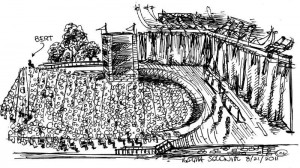
Those Lips, Those Eyes, United Artists, 1980, Cain Park amphitheater, Cleveland Heights. Bert Stratton at far left.
—-
A version of this story is crossposted today at CoolCleveland.com.
August 31, 2011 4 Comments
YIDDISHE CUP
AND THE KLONDIKES
Ben & Jerry’s was supposed to hand out free ice cream at last year’s Yiddishe Cup concert in University Heights, Ohio. But Ben & Jerry’s didn’t show up. They received no reminder call from the city, supposedly.
Why would a private business, like Ben & Jerry’s, need a reminder call from the government? Isn’t it supposed to be the other way around?
The University Heights mayor borrowed Yiddishe Cup’s microphone and told the crowd, “Get your tomatoes ready. We’ve had a snafu. There’s no ice cream tonight!”
Nobody booed. There was no ice cream riot. Klezmer crowds are polite. The Russians have assimilated.
Maybe the city will pass out Klondike bars tomorrow night (for the 2011 Yiddishe Cup concert). Easier to deal with — Klondikes. And they’re kosher. Just dole out a few cartons of Klondikes, like in years past.
Ice cream hondling (negotiating) is tough — on the band. Last year’s show was our best because listeners weren’t continually streaming back and forth from the ice cream stand. There was no ice cream stand.
I told the guys in the band to stop making ice cream references. I said, “We might not be asked back if you keep talking about ice cream.”
Yiddishe Cup’s pianist, Alan Douglass, told the audience how happy he was they hadn’t left. He said, “You mean you came to hear us? You really like us!” Let it go, Alan.
Tomorrow at University Heights, see Yiddishe Cup and the Klondikes. That’s my prediction.
—-
Yiddishe Cup plays 7 p.m. tomorrow (Thurs. Aug. 25) at Wiley Middle School auditorium, 2181 Miramar Blvd., University Hts., Ohio. The concert is in the air-conditioned auditorium, rather than on the lawn, due to outside construction. Free admission. Might be ice cream. Might not, too. Call 216-932-7800 for more info.
You’ll hear the premiere of Yiddishe Cup’s song “Warrensville and Cedar Road,” written especially for the Wiley concert.
Here’s a clip of Yiddishe Cup at the Wiley auditorium two years ago:
August 24, 2011 3 Comments
SMALL TOUGH JEWS
The small tough Jews in my high school were wrestlers, except for the one who was a gymnast.
I saw the gymnast — and his wife — years later at a Yiddishe Cup concert. I said to the wife, “Your husband was a star!” She didn’t seem to know that.
The great Reed Klein. He went on to the Ohio State gymnastics team. Reed was the only gymnast in our high school. There was no team. Reed was an iron man and one small tough Jew. Five-foot-five, max.
The other small tough Jews were Harry Kramer and Steve Gold. They wrestled in very low weight classes, like 93 pounds and 103 pounds in junior high.
Small Jewish wrestlers — as a classification — are still with us. The Cleveland Jewish News ran an article titled “Gross, Jacober, Harris place in state mat meet.” The boys are Beachwood High’s 112-, 130- and 125-pound wrestlers.
My son Jack wrestled in middle school. The matches were so primal: two or three minutes of animal behavior in a stinky windowless wrestling room. Tough and scary. And I was just watching.
My wife dated a wrestler in high school.
Maybe I should have wrestled.
It never entered my mind. I don’t like singlets. I don’t like armpits – other guys’. I don’t like headlocks, unless Bobo Brazil is giving one to Lord Layton, and it’s 1960.
——-
The yideo below, “Stratton of Judea,” is from the Klezmer Guy live show. The clip is about my father changing his last name. One of my better efforts.
The text — but not the video — was posted here Sept. 16, 2009.
—–
Yiddishe Cup plays 7 p.m. Thurs., Aug 25, at Wiley Middle School, 2181 Miramar Blvd., University Heights, Ohio. The concert is in the air-conditioned auditorium rather than on the lawn, due to construction outside the building. Free. More info at 216-932-7800.
August 17, 2011 6 Comments
TOSSED OUT
I rented to a commercial photographer who moved out after 23 years and left a store full of manila folders, invoices, developing trays and chemicals. Three dumpsters’ worth. He shouldn’t have done that. I had never hassled him about late fees.
Down the street, the Armed Forces Recruiting Center moved out after 40 years and left a punching bag, three couches, 27 chairs, a lot of “Army of One” promotional material and a 1970s stereo system. That wasn’t the half of it.
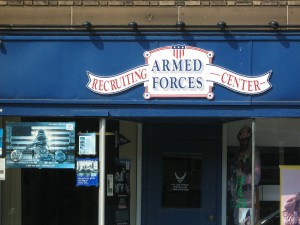 The good news: the government — unlike the photographer — paid for the clean-up. Also, I got $75 for the Armed Forces sign on Craigslist. (I thought the sign would go for more.)
The good news: the government — unlike the photographer — paid for the clean-up. Also, I got $75 for the Armed Forces sign on Craigslist. (I thought the sign would go for more.)
I’m sitting on about 3,000 perfume bottles. I’m not totally sure they are perfume bottles. Martha’s Beauty Salon left the bottles in the basement. The bottles are packed in cartons with zone numbers on them, not zip codes. (Pre-1963.)
Every month I serve an eviction notice on a lawyer. Every single month. Then I file an eviction on him.
The lawyer rents a storefront office. I pay the $85 eviction filing fee and get a court date.
The day before the court hearing, the lawyer pays the rent, including the legal fees. Like clockwork.
Until he doesn’t.
At eviction court he said to me, “I’m broke.” No tears, no dough. “You’re in business. You understand,” he said. “I don’t have the money. I’m moving out.”
He turned in the keys and cleaned the place.
He stole money from his clients. He was disbarred in April and convicted of grand theft in June. Sentencing is next month.
Note to the probation department: he left the store clean.
—-
As my dad used to say . . .
Meaning: Pay the rent. We aren’t a loan company.
August 10, 2011 5 Comments
MUSIC! CALL THE COPS
Constantin Ferrito, a neighbor, was an usher at the Stadium. Good for him. Not good for us — the neighborhood kids. Mr. Ferritto didn’t allow kids to sneak into the box seats, even though Cleveland Municipal Stadium was usually three-quarters empty.
Mr. Ferritto’s wife was also hard on us. Specifically, she was very sensitive to noise — except her son’s. Her son, John, played piano a lot. He would not shut up on piano.
I practiced an hour a day on clarinet; John Ferritto was just getting warmed up at an hour.
Another neighbor, Frankie, practiced a half hour on trumpet and a half hour on piano. His father kept a clock on him. Frank’s sister punched the clock for a half hour on piano and a half hour on accordion.
John Ferritto ultimately attended the Cleveland Institute of Music and Yale, and became a conductor.
Right now –- a million decades later –- a neighbor is playing drums a block from me. I might call the cops on him. I’m sick of hearing his drums. He plays in his garage, and the sound reverberates. He plays all year round, even during school hours; he must be an adult.
Should I call the cops?
Nobody called the cops on John Ferritto. Nobody called the cops on me.
Somebody did call the cops on Yiddishe Cup. We were playing a bar mitzvah party in a backyard in Shaker Heights. No music allowed in Shaker after 10 p.m.
I can’t call the cops.
My best option: Go nuts.
—
Footnote: “Frank” is a pseudonym.
—-
Here’s an original yideo, “Is Dave Brubeck Jewish?”
August 3, 2011 5 Comments
OLD SHUL
Zemach Zedek, on Lee Road by the old Cleveland Heights post office, is the only storefront shul left in Cleveland.
I was in Zemach Zedek (Z.Z.) a few months ago with my cousin’s teenage son Aaron, who was visiting from Kansas City. Aaron is Orthodox and wanted to go to morning minyan (quorum).
Because I’m a lefty, I needed left-handed tefillin (tefillin). The nine other guys in the minyan had to scramble for lefty tefillin. (Lefty tefillin are wrapped different than righty. Fact: Lefty tefillin go on the right arm.)
Afterward, I asked Aaron if he wanted to go back the next day to daven (pray). He said, “I don’t think anybody there speaks English. It was like Europe or something.” So we went to Green Road, to a Modern Orthodox shul.
I knew the rabbi at Z.Z. Rabbi Kazen. He wasn’t there. He was living with family in New York, I heard.
Chabad-Lubavitch –- headquartered in New York –- had sent Rabbi Kazen out to Cleveland in 1953. Rabbi Kazen was a shochet (ritual slaughterer) at Coventry Poultry while running the shul. Coventry was the last live kosher poultry market in Cleveland. (Rabbi Kazen was involved in a few “lasts.”) Coventry Poultry closed in 1995 to make way for a parking garage. My wife, Alice, did a photo project on Rabbi Kazen in 1980:
I admired Rabbi Kazen. He drove a school bus — often filled with Russian immigrants — and lived on Glenmont Road in the student area. He appeared to be the emes: the real thing. He fed the poor and was usually in a good mood. Rabbi Kazen looked like Menachem Schneerson, the late head rabbi of Chabad. (No biggie. Half of Chabad looks like Rabbi Schneerson.)
I first heard the word freylekh at Rabbi Kazen’s in 1978. A davener (worshipper) said to Rabbi Kazen, “Your daughter’s khasene, rabbi, it should be freylekh.”
What? I didn’t understand the Yiddish “punch line.”
I guessed the first part correctly (chasene) from the context. Wedding. [Years later, an Orthodox woman said to me, “Does Yiddishe Cup play chasenes?” I said, “Yes, we’ve played for Hadassah.” She said, “Chasenes!”]
I asked the davener at Rabbi Kazen’s what freylekh meant.
Freylekh is “cheerful, lively.”
Freylekhs is also a klezmer term for a lively fast dance. I say “freylekhs” a lot now. I announce: “The band is going to play a freylekhs, hora, ‘Hava Nagilah’ medley . . . whatever.” And we hit the downbeat.
Rabbi Kazen died last week at 92 in New York.
Strike up a freylekhs — and a “Chicken Dance” lick — for Rabbi Kazen and Z.Z.
July 20, 2011 11 Comments
EVERYTHING IS ALL RIGHT
(UP ON THE ROOF)
A tenant peed in the heating ducts and poured aquarium gravel into the toilet. Several other residents used the cheap hollow-core doors for karate practice. The apartment building looked genteel, but it wasn’t. Jamestown Village, on the West Side, was a post-war, modern apartment complex.
Many tenants lived beyond their means; they liked the swimming pool, the playground and A/C, but couldn’t really afford these amenities. There were a lot of evictions.
The complex was garden-style, low-rise buildings set around a pool. All the buildings had mansard roofs like McDonald’s. My father kept a sketch of Jamestown Village in our family room.
A high school wrestling coach, who was also a big-time real estate investor, bought the complex and converted it to condos in 1976. That worked out well for the coach and my dad. As my dad’s banker said, “You made your money, and he made his.”
I worked on the Jamestown Village roof, replacing lids to vents. The lids were called jap caps because they looked like coolie hats.
There was no better place than a roof top — at least a flat roof. You could see everybody, and nobody could see you. That’s why cops in The Wire go on roofs so often.
But it wasn’t all fun and games on the roof. There was some work too:
Lesson 1: Modified bitumen membrane is the basic black roof, usually applied with a blow torch.
Lesson 2: Thermoplastic polyolefin (TPO) roofs look like white pool liner. Your roof is reflective. Cleveland has more “heat” days than “cool” days, which means white roofs (TPOs) are great in Dallas, but not so great in Cleveland.
Lesson 3: Summer is the best time to put on a roof. I had a roof installed in April and it rained constantly, and the job was a mess; we had leaks into the apartments below.
Lesson 4: Consider vacationing on a roof. There might be an old longue chair up there, left by a rebellious tenant who sneaked up for sunbathing and serious drinking. People want to be on roofs badly.
There is usually an empty tar bucket for your guest to sit on.

Roof & Relaxation
—-
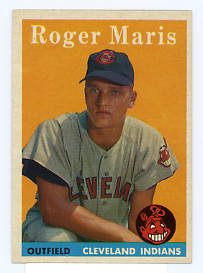 The Cleveland Plain Dealer ran an op-ed of mine yesterday. Something about baseball cards. Gotta write about baseball if you want to be in the big leagues: “Investment Home Run.”
The Cleveland Plain Dealer ran an op-ed of mine yesterday. Something about baseball cards. Gotta write about baseball if you want to be in the big leagues: “Investment Home Run.”
July 13, 2011 3 Comments
HE MADE A LIVING AT MUSIC

Barry Weinberg, the owner of Mayfield Music in Cleveland Heights, rented PA systems and sold amps, guitars and drums. He died at 55. He was a rocker who lived hard. The sign at the back of his store read Give Me the Dough and You Can Go.
He carried a quality line of blues harps.
Before Barry, Mayfield Music was Chick Chaikin’s store. Chick lived pretty hard too, but in a middle-class way: Chick golfed, raised a family and played thousands of cocktail-piano gigs.

Chick Chaikin
Chick was a big-band leader and solo pianist for decades. He played six nights a week at the Colony Restaurant, and knew just about every pop song written, according to trumpeter Bob Dreifort, who I talked to recently.
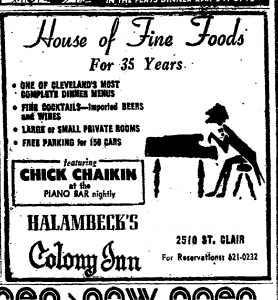
Cleveland Plain Dealer, 8/23/74
Chick’s brother Bill went out to Hollywood and eventually ran a movie studio, Avco Embassy. Bill was involved in The Graduate and more.
“I could have gone to the Coast too,” Chick said. “But my life is here, and I have my work, although every winter I say this is it. But I’m still here.” (Plain Dealer interview, 1977)
Chick’s store was Currier-Chaikin Music. Chick’s business partner, John Currier, was even older than Chick. John Currier had played piano at Euclid Beach Park in the 1920s.
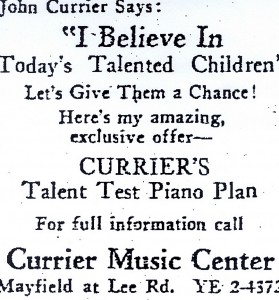
Cleveland Plain Dealer 1/23/53
Chick called me “Toby’s son.” Chick didn’t know my name. Chick and my father, Toby, were Kinsman Road boys.
Most of my father’s friends and acquaintances were businessmen: shoe store owners, insurance men, pawn shop owners.
How did my dad know a full-time musician? I guess Toby had no choice. Toby and Chick grew up almost next door to each other.
How did Chick wind up a full-time musician? I didn’t ask old people questions like that when I was in my twenties.
Chick’s life was all about family and music, his daughter, Jeri, told me this year. For a while Chick had a side job giving private music lessons through Cleveland public schools.I didn’t have the chutzpah to ask Jeri if there was more to Chick’s headstone than Leonard ‘Chick’ Chaikin 1915-2000.
Here are three fitting epitaphs:
a) “Here lies a man who made a living at music.”
b) “Chick a la King.”
c) “I’m here 7 nights a week.”
July 6, 2011 10 Comments
WHERE DID YOU GO TO
HIGH SCHOOL?
When Mel, the bride’s father, inquired about Yiddishe Cup’s fees, he said his grandmother had baby-sat Joel Grey (Mickey Katz’s son). Mel asked if Yiddishe Cup knew any Mickey Katz tunes.
I said, “We play more Mickey Katz songs than anybody in the world! You’ve heard us, right?”
No, he hadn’t.
I said, “Have you been under a rock for twenty-one years?”
Mel was from Cleveland. Where had he been hiding? Mel said he didn’t get around much. He used to get around. He said, “Where did you go to high school?”
“Brush,” I said.
Mel graduated from nearby Cleveland Heights High — a rival — but, nevertheless, he was OK with Brush High. He had played softball with Brush boys in a JCC league. Mel was six years old than me; I didn’t know any of his Brush buddies.
Mel’s daughter — the bride — was 31 and living in Brooklyn — Yiddishe Cup’s target demographic. I said, “Has your daughter checked out Yiddishe Cup’s Web site? It doesn’t matter if you like Mickey Katz. She’s calling the shots. ”
“Do you know Joel Schackne?” Mel said. (Schackne had been a champion tennis player at Heights High.)
“I know of him. Whose idea is the Jewish music?”
“Schackne is in Florida. He’s still playing tennis.”
“What does your daughter think about Jewish music?”
“What AZA were you in?” (AZA: a B’nai B’rith boys’ club.)
“I was in a JCC club.”
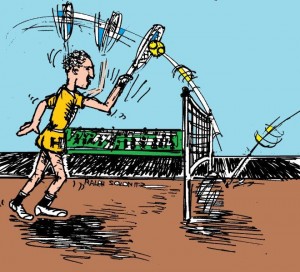
The Great Schackne
A week later, I met Bob, a cleaning supply man, and also a Heights High grad. I met him at an AIPAC meeting. Bob was not OK with Brush. He said, “Brush was a bunch of greasers and Italians!”
The AIPAC speaker, a Brush grad by the way, had left Cleveland years ago to attain multiple Ivy League degrees and become a weapons analyst with the government, maybe the CIA. He was an old friend of mine. I wanted to talk Iranian nuclear capabilities with him. The inside story. He didn’t.
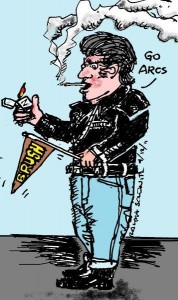 Ron, a Brush graduate living in Connecticut, phoned to say he was in Cleveland at a nursing home, visiting his dying mother. Ron asked if anybody was still in town. (“Anybody” meant “Our Crowd.”)
Ron, a Brush graduate living in Connecticut, phoned to say he was in Cleveland at a nursing home, visiting his dying mother. Ron asked if anybody was still in town. (“Anybody” meant “Our Crowd.”)
I said, “Nobody is here.” Most of our gang had left. The Jewish guys still in town were, for the most part, entrepreneurs and family-business owners. A couple local guys had even made serious money. One, who built cell phone towers, was a playboy with femme fatales poolside.
Howard, a Brush grad in New York, called. He was coming through Cleveland. His parents were moving to assisted living. He said we should get together.
Did I have a post–high school life?
I think so. I’m not stuck on high school. But the subject does come up. I live in my hometown. What can I say?
Go Arcs.
—-
1. Mel didn’t hire Yiddishe Cup for his daughter’s wedding.
2. The Arcs is the nickname of Charles F. Brush High School. Brush, a Cleveland inventor, developed the arc light, which illuminated streets prior to the incandescent bulb.
—-
A version of this post appeared in the Heights Observer online on April 26, 2011.
June 29, 2011 3 Comments
JUST SAY NO TO RANDOMIZATION
The first three digits in your Social Security number mean something. For instance, 545-573 and 602-626 indicate you are a native Californian. 268-302, an Ohioan.
That’s history. Effective Saturday, newly issued Social Security numbers (SSNs) will have no geographical significance. The “Social Security Number Randomization” policy hits.
New Gavins, Emmas and Destinys will get random SSNs.
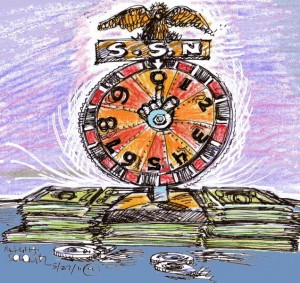
I read about the randomization policy in the Social Security Administration/IRS quarterly newsletter to employers.
I look at Social Security numbers a lot because I’m a landlord. One apartment applicant wrote his SSN as 900-. There are no 900-999s. I turned him down on the spot. Likewise, there are no 000s-. And I don’t rent to 666-; that’s the devil’s number, and the Social Security Administration (SSA) doesn’t stock it.
The SSA website says, “If your [SSN] concerns are firmly rooted in your religious beliefs or cultural traditions, Social Security will review your request.”
The new randomization policy will extend the number of available SSNs. There are 435 million unused numbers. Dead people’s numbers go to the grave with them.
What about a vanity SSN? Are the feds thinking of that?
They should. Parents might pay $100 for a snazzy SSN — say, a 999-. Something that would stand out on Baby Emma’s college application 17 years from now.
Just say no to randomization.
Baby Emma is not a random number. And Gavin is an Ohioan — a proud Buckeye. Destiny, she is a California girl (602-).
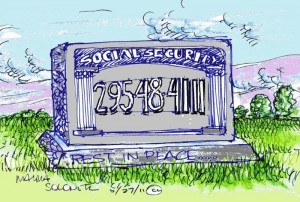
Joe Buckeye
—-
Due to a computer glitch, this post (“Just Say No to Randomization”) didn’t go up on Wednesday June 22. It went up today, Saturday June 25.
—-
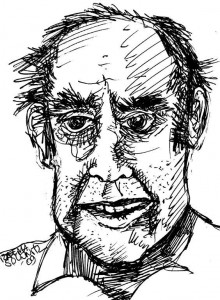 Here’s an op-ed I wrote for the Cleveland Plain Dealer last Sunday. “Harvey Pekar’s Hollywood Hustle.”
Here’s an op-ed I wrote for the Cleveland Plain Dealer last Sunday. “Harvey Pekar’s Hollywood Hustle.”
June 25, 2011 3 Comments
COMPARATIVE GENOCIDE
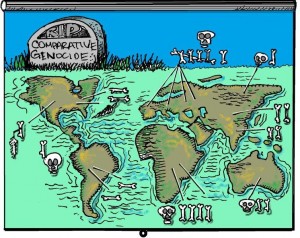
Gratz College in Philadelphia offers an online course called Comparative Genocide.
The teacher, Sean Martin, lives in Cleveland.
I said to Sean, “I think Don DeLillo wrote about Hitler Studies in a novel, but that was a novel. Comparative Genocide, is it real?”
“Gratz named the course,” Sean said. “I didn’t. It’s a real course.”
Sean also teaches classes on ethnicity and the Holocaust in Cleveland. He speaks Yiddish and Polish, and has a PhD.
Sean, from Weirton, West Virginia, is of Italian and Appalachian descent. (There is also a Yiddish scholar from Japan.)
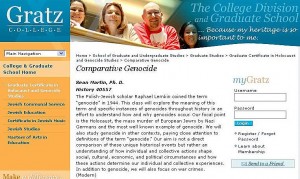 I said to Sean, “You’re interested in everything you’re not, is that it?”
I said to Sean, “You’re interested in everything you’re not, is that it?”
“Exactly,” he said.
“In the Comparative Genocide class, does everybody try to top the Jews’ story? ” I said. “The Jews are the gold standard?”
“There’s some of that going on,” Sean said. “But that’s not the intent. Let me repeat, I didn’t pick the name of the course. Gratz has got to change that.”
—–
Here’s an original Klezmer Guy movie, “Nine Days to Die.” It’s funny. My “bro” — Stuart — has followed me my whole life. Or I’ve followed him.
June 15, 2011 4 Comments
HYPNOTIC AND BRUISING KLEZMER
The Challah Fame announced its lecture series today: The Art of Klezmer . . . How to Make it Hypnotic, Bruising and Revelatory.
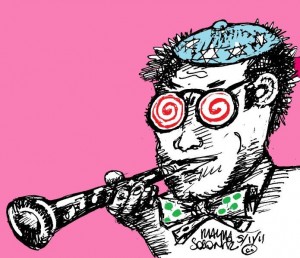
Klez Mezzrow, lecture series curator
The lectures are free, but attendees must bring doctors’ permission slips. Some lectures might be dangerous, according to the brochure.
The first lecture is June 15, featuring Hankus Netsky, bandleader of the Klezmer Conservatory Band.
6/15 Hankus Netsky HOW DO I STOP THIS THING?
Should a klezmer song end with a “squirt” (quarter note) or a “pop” (eighth note)? Or how about a simple I-V-I chord tag? Or should the bandleader just scream, “It was all a mistake!”
Netsky is clear and emotive. Expect audience participation, including hummus-smearing and firearms.
6/22 Sarah Gordon WEATHER THAT KILLS
Sarah, a singer and third-grade teacher in New York, will talk about corporal punishment. Gordon’s punk-klez band, Yiddish Princess, is best known for “Painkiller” and “Weather That Kills.” Gordon gives us an insider’s look at the combative multivalent New York klezmer scene. Bring knives. Sarah is going to recreate the West Side Story switchblade scene in Yiddish. Volunteers needed.
7/9 Don Friedman PRAISED BE KLEZMER!
Yiddishe Cup’s drummer, Don Friedman, is the spiritual leader of The Churchagogue in Twinsburg, Ohio. Donny invented the Jewish freewill offering; it isn’t free. Donny was the recipient of Sweden’s “Little Drummer Boy” prize ($753,000) last year and invested much of that in upgrading The Churchagogue, 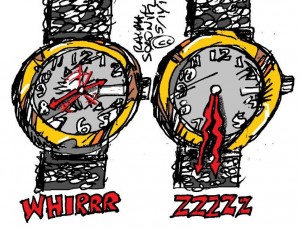 which attracts more than 2,000 worshippers on a typical shabbes morning. Free refills on the Mogen David through “Eyn Keloheynu.” Donny delivers his most famous sermon tonight: “Time. Sometimes it passes slowly. Sometimes it flies by.”
which attracts more than 2,000 worshippers on a typical shabbes morning. Free refills on the Mogen David through “Eyn Keloheynu.” Donny delivers his most famous sermon tonight: “Time. Sometimes it passes slowly. Sometimes it flies by.”
7/29 Alice Stratton OLD-SCHOOL MATH
Alice talks about pacing and musical symmetry. She takes us back to the days when hora tempos were T-120 (120 beats/minute) and veteran pianist Pete Sokolow‘s blood pressure was under 120. Alice, a dance leader with Yiddishe Cup, makes her second Challah Fame appearance tonight. In 2000 she debuted her dance “Some Kind of Cheesy Orgy” at The Challah Fame grand opening.
8/6 Daniel Kahn SLACKIN’ WITH DANNY K
Daniel Kahn, a.k.a. Danny K, chants the trope of recuperative klezmer here. No worries, it’s all good. How to enjoy life by playing music, singing, or just listening. Kahn, from Berlin, does mixed-genre exploring, using ketchup, sauerkraut and clarinets. Samples afterward.
9/15 Michael Winograd THE 2011 KLEZMER MANIFESTO
Wino, the 28-year-old klez clarinet phenom, delivers the first klez manifesto since Alicia Svigals wailed her “Against Nostalgia” rant at the 1996 Wesleyan University Klezmer Conference.
Here are some of Winograd’s key points:
1. It’s a lonely world. Hi, everybody.
2. I’ve done many things wrong. Sorry about that.
3. I get paid to eat at weddings. Why?
4. A scrap of paper in my wallet says I owe you. Shut up, scrap!
10/3 Ted Stratton MUSIC THAT REPELS
Stratton focuses on life’s basics: dirt, worms, aphids, flies and klezmer music. What’s real, what’s not? What’s fake, what’s authentic? What’s cool, what’s dumb?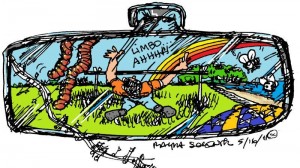 Stratton looks at the avant-garde in his rearview mirror; he’s way ahead of you. His latest book is The Limbo: Still Rockin’ at 50. How Long Can It Go?
Stratton looks at the avant-garde in his rearview mirror; he’s way ahead of you. His latest book is The Limbo: Still Rockin’ at 50. How Long Can It Go?
10/13 Mark Rubin THE IN-N-OUT BURGER IN IASI, ROMANIA
Rubin leads us on a virtual eating tour deep into Europe, a la Borat. Rubin focuses primarily on risk-taking in eating.
Rubin will be barbecuing ribs throughout the lecture and not washing his hands. Some spitting too. Samples afterward.
11/2 Daniel Ducoff AQUA-KLEZMER
Daniel Ducoff, a swimmer and Yiddishe Cup dance leader, talks about the awe-inspiring aspects of the Jewish water experience.
What is “difficult” will be “not difficult” after Daniel’s lecture. You will not be afraid of the 10-meter board or the mikvah.
Mystical, glorious and powerful mayim (water). Heartbreaking too. Bring a suit. There will be a baby pool and high board. Expect some broken bones.
11/19 Walt Mahovlich SITUATION REPORT: THE GYPSIES AND THE JEWS
Walt‘s lecture is a split-perception event. Half the audience wears “I ♥Yiddish” buttons, and the other half gets
“I ♥ Roma” badges. Challah Fame staffers are the U.N. observers. Let’s see what happens. Situation report to follow.
12/1 Moshe Berlin THE BOUNDARIES OF BLUR
Israeli clarinetist Moshe Berlin lectures in Hebrew on the differences between Israeli and American klezmer music. Free Holy Land yarmulkes to all who attend. Also, Moshe will pass out learsi refrigerator magnets afterwards. “Learsi” is “Israel” spelled backwards. The Learsi Project encourages you to read everything — even English —
right-to-left.
—
Footnote: 1.3 percent of the words in this post are stolen from the Poetry Project Newsletter #226.
—
Enjoy the “Klezmer Guy” blog, accompanied by beer, food
and music . . .
Nighttown
Tues. (June 14)
7:30 p.m.
$10
Spoken word, klezmer, rock, pop, Tin Pan Alley and alley.
Bert Stratton, clarinet, spoken word
Alan Douglass, piano, vocals
Jack Stratton, drums, beat-box
Lots of new material in this show. Your name might pop up in the script.
Nighttown
12387 Cedar Rd., Cleveland Hts.
216-795-0550
www.nighttowncleveland.com
—
Yiddishe Cup — the whole band — is at Parade The Circle, Cleveland, 11 a.m. Sat. (June 11). We’re playing a pre-parade concert.
We’ll also be at Temple Israel (Akron, Ohio) Sat. night (June 11), 8 p.m., for a concert. 330-762-8617.
—
Check out this funny and good 1970 Kickstarter video by Yiddishe Cup’s alternate drummer, Jack Stratton.
June 8, 2011 5 Comments

